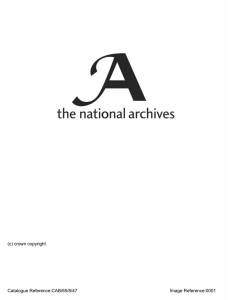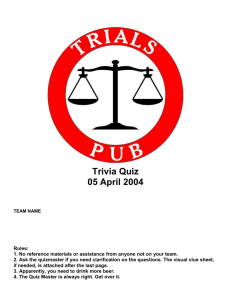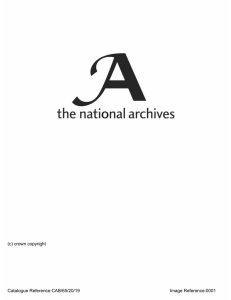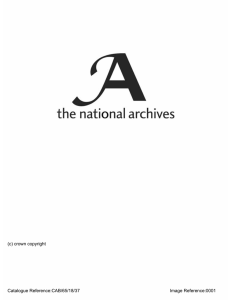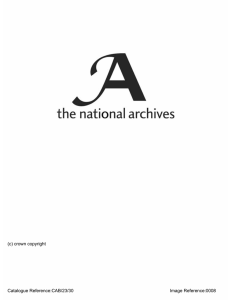(c) crown copyright Catalogue Reference:CAB/65/20/28 Image Reference:0001
advertisement
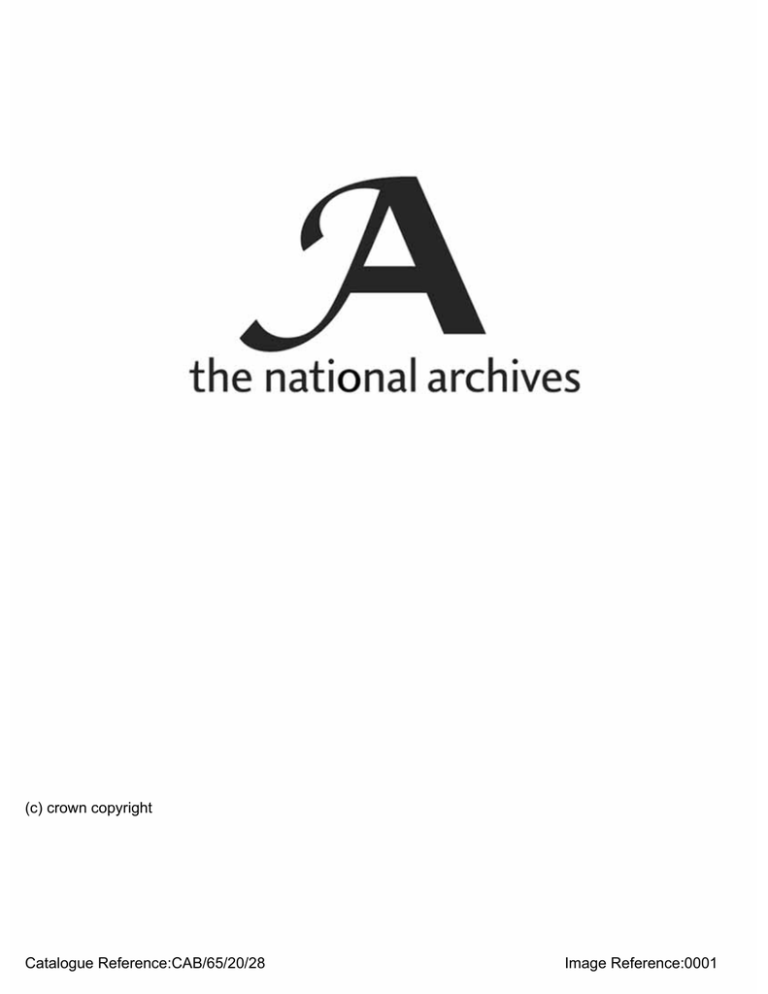
(c) crown copyright Catalogue Reference:CAB/65/20/28 Image Reference:0001 T H I S D O C U M E N T IS T H E P R O P E R T Y OP H I S B R I T A N N I C M A J E S T Y ' S Printed for the War Cabinet. GOVERNMENT December 1941. Copy No. SECRET. W.M. (41) 136th Conclusions. TO BE K E P T U N D E R LOCK A N D K E Y . It is requested that special care may be taken to ensure the secrecy of this document. WAR CABINET 136 (41). CONCLUSIONS of a Meeting of the War Cabinet held at 10 Downing S.W. 1, on Friday, December 26, 1941, at 11-30 A . M . Street, Present: The Right Hon. C. R. ATTLEE, M.P., Lord Privy Seal (in the Chair). The Right Hon. Sir J O H N A N D E R S O N , M.P., Lord President of the Council. The Right Hon. A . G R E E N W O O D , M.P., Minister without Portfolio. The Right Hon. Sir K I N G S L E Y W O O D , M.P., Chancellor of the Exchequer. The Right Hon. E R N E S T B E V I N , M.P., Minister of Labour and National Service. The following were also present: The Right Hon. H E R B E R T M O R R I S O N , M.P., Secretary of State for the Home Department and Minister of Home Security. The Right Hon. A . V . A L E X A N D E R , M.P., Eirst Lord of the Admiralty. The Right Hon. V I S C O U N T C R A N B O R N E , Secretary of State for Dominion Affairs. Captain the MARGESSON, Right Hon. H. D. of State M . P . , Secretary for War. Hon. Sir A R C H I B A L D Bt., M . P . , Secretary of State for Air. The Right SINCLAIR, Sir O R M E S A R G E N T , Deputy UnderSecretary of State, Foreign Office. Secretariat. , Sir EDWARD BRIDGES. Mr. L. F. BURGIS. [23282] B 4 4 WAR CABINET 136 ( M ) . CONTENTS. Minute No. Subject. 1 The Prime Minister's Visit to the United States.. 2 The Press 3 The Prime Minister of New Zealand 4 5 Timor St. Pierre and Miquelon 6 U.S.S.R. Trade U n i o n Delegation. 7 Day of National Prayer 8 Naval, Military and Air Operations Air Operations. Naval Operations. Military Operations: U.S.S.R. Libya. H o n g Kong. 9 Air Raid Damage The Prime Ministers Yisit to^the -United States. 1. The Lord Privy Seal read to the War Cabinet a telegram from the Prime Minister (Grey No. 105) as to the probable length of his stay. The Prime Minister proposed to spend a day or two in Canada before returning to this country. The War Cabinet took note of this statement. The Press. (Previous Reference: W . M . (41) 1 3 5 t h Conclusions, M i n u t e 3.) 2. Further reference was made to the articles which had appeared in certain newspapers on Christmas Eve to the effect that German troops were massing for a move into Spain and that Marshal Petain had resigned. A telegram from Washington (No. 6029) showed that some irritation had been caused in the United States by the fact that credence had apparently been given in London to these reports. A reply had been sent (telegram No. 7245) to Washington explaining the circumstances in which these reports, which had arrived in the early hours of the morning, had been given prominence by certain newspapers. The two main points made in discussion were: first, that it would be desirable that the Editors should again be reminded that it was contrary to the public interest that prominence should be given to rumours of this kind; secondly, that consideration should be given to the question whether the mechanism could be improved for giving guidance to the Press in regard to reports which were received very shortly before the papers went to press. The Lord Privy Seal undertook to take up these points with the Ministry of Information. The Prime Minister of New Zealand. 3. The Lord Privy Seal read a Christmas message from the Prime Minister of New Zealand to the Prime Minister and the War Cabinet. The Prime Minister would no doubt send a personal replyj but he thought that a message should also be sent from the War Cabinet as a whole. The War Cabinet— Invited the Lord Privy Seal to despatch a message in their name. T i m o r . ( P r e v i o u s R e f e r e n c e - W . M . (41) 1 3 5 t h Conclusions, M i n u t e 2.) 4. Attention was drawn to telegram No. 551 from the Prime Minister of the Commonwealth of Australia to the Prime Minister Zealand, repeated to the Secretary of State for Dominion Affairs (No. 823). This telegram gave a wholly misleading and inaccurate account of events. It was agreed that it was important that a strong reply should be sent, pointing out how misleading was the account of events contained in this telegram. A t the same time, it was probably better not to do this until the Australian Government has agreed to send troops to Timor to replace the Dutch portion of the joint Australian-Dutch contingent. (A telegram on this, latter point had been despatched immediately the consent of the Dutch Prime Minister had been obtained.) o f N e w The War C a b i n e t Invited the Lord President of the Council and the Secretary of State, for Dominion Affairs to arrange for a suitable reply to be sent i n due course to the telegram from the Australian Government referred to. [23282] B 2 mmmimmmmmmmmum St. Pierce and 5. The Lord President of the Council reported that on the 24th December Free French naval forces under the command of Miquelon. Admiral Muselier, and on instructions from General de Gaulle, had rallied the islands of St. Pierre and Miquelon to Free France. The Vichy Governor had been arrested, and a plebiscite was being held that day of the inhabitants, who had received Admiral Muselier enthusiastically. This action was entirely contrary to the assurance given by General de Gaulle that he would not put into operation the Free French plan to rally these islands, since the United States Govern­ ment was strongly opposed to Free French action in connexion with St. Pierre. The Free French Commissioner for Foreign Affairs (M. Dejean), who had been summoned to the Foreign Office, had admitted that General de Gaulle had given orders for the operation to be effected. The excuse given, namely, that General de Gaulle, when he gave his assurance, had been unaware of the Canadian Government^ intention, with the approval of the United States Government, to send personnel to take control of the wireless station by peaceful means, was entirely beside the point. The matter had been further complicated by a public announcement by Mr. Hull to the effect that the United States and Canadian Governments were examining what steps could be taken to restore the status quo in the islands. Any such action seemed to be out of the question. The War Cabinet— (a) Invited the Lord President of the Council to send for General de Gaulle and inform him that his conduct in this matter could not be tolerated, and had placed us in a position of great embarrassment. (b) Invited the Lord President of the Council to ensure that the Prime Minister was acquainted with the full facts of the position, and to ask him to discuss the position with President Roosevelt and Mr. Mackenzie King, who^ was expected to arrive that day at Washington. (c) Invited the Secretary of State for Dominion Affairs to send a telegram to the Canadian Government, informing them of (6) above, and asking them to take no action in regard to any proposal to restore the status quo in the islands. U.S.S.R. Trade Union Delegation. (Previous Reference: W . M . (41) 1 2 2 n d Conclusions, M i n u t e 4.) 6. Attention was drawn to telegram No. 53 Hectic reporting that the Soviet Trade Union Delegation to the United Kingdom were travelling from Moscow with the Foreign Secretary. The latter asked that the necessary arrangements should be made for their accommodation on the train and their reception in London, and that Sir Walter Citrine should be informed. It was understood that the T.U.C. were acting as hosts to the Soviet Trade Union Delegation, but it was agreed that His Majesty's Government should participate in the arrangements for the Delegation^ reception. The War C a b i n e t ^ Asked the Foreign Office to arrange for the Secretary of the Government Hospitality Fund to get in touch with Sir Walter Citrine, and to concert plans with him for the reception of the Delegation. D a y of N a t i o n a l Prayer, (Previous Reference: W . M . (40) 2 3 7 t h Conclusions, M i n u t e 2.) 7. The Lord Privy Seal read a telegram which had been received from the Prime Minister reporting that the President of the United States had appointed the 1st January to be a Day of National Prayer in the United States, and suggesting that urgent consideration should be given, in consultation with the appropriate authorities, to see whether it would not be desirable to make a similar arrangement in the United Kingdom. It was pointed out that on previous occasions a Sunday had nearly always been chosen as a Day of National Prayer. Further, there might be some difficulty in making the necessary arrangements at short notice. Nevertheless, the War Cabinet were in favour of the plan, provided that it proved generally acceptable to the religious leaders and was found practicable. The War C a b i n e t Invited the Home Secretary to consult with the religious leaders in the course of the day, and to report the result to the Lord President of the Council, with a view to a submission being made to The King that evening. If it was decided to appoint the 1st January as a Day of National Prayer in this country, the Dominion Govern­ ments should be notified of the action taken. Naval, Military and Air Operations. (Previous Eef erenee: W . M . (41) 1 3 4 t h Conclusions, M i n u t e 3.) 8. The War Cabinet were given the following information :— During an air attack on Rangoon on the 23rd December ten out of sixty Japanese bombers, escorted by fighters, had been shot down. A big German tanker, which had previously been hit, had again been attacked in Spanish territorial waters. The tanker had now been beached. Air O p e r a t i o n s . Naval Operations. Military Operations. U.S.S.R. Libya. Hong Kong. Two tankers had been reported on fire in Haifa harbour on the 25th December. The Ulysses, which had been reported lost, was now known to be safe. Reports during the previous few days had indicated an increase in our shipping losses. The Russians reported that the morale of the German. prisoners captured had been very low, and that operations were proceeding favourably. Operations in Libya were proceeding satisfactorily, though it was possible that what remained of the German force might escape through the gap at Agedabia. . Some 437 disabled enemy aircraft had been collected on various aerodromes during our advance. U p to the 26th December 4,300 German and 7,500 Italian prisoners had been counted at Alexandria and in the base hospitals. The garrison at Hong Kong had surrendered on the previous day. It would seem that water supplies had been exhausted. The War Cabinet took note of the above statements. Air Raid Damage. 9. The Minister of Home Security stated that some thirty-nine enemy aircraft had operated against this country, mainly in the Thames Estuary, on the previous night, six making a landfall. A few incendiary bombs had been dropped at Walton-on-the-JNaze. A t 9 - 45 A . M . on Christmas morning two aircraft had flown over Fairlight, machine-gunning civilians. These aircraft had been British machines. The incident was being enquired into. The War Cabinet took note of this statement. Great George Street, S. W. 1, December 26, 1941.


